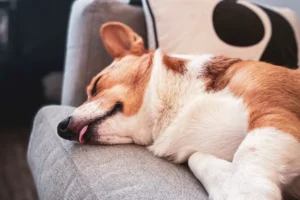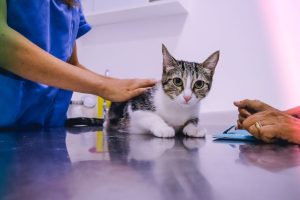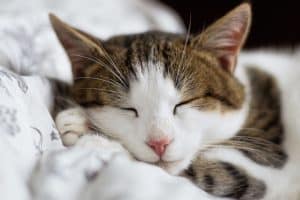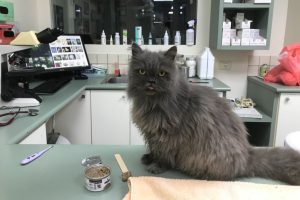Is your cat sneezing after getting vaccinated? It can be concerning to see your furry friend experiencing this symptom after a trip to the vet. Let’s explore why this might be happening and what you can do to help your cat feel better.
Answer: After receiving a vaccination, it is possible for cats to experience mild side effects such as sneezing. This is usually a normal response as their immune system reacts to the vaccine and builds up immunity against specific diseases.
Understanding Sneezing After Vaccination
If you’ve noticed your cat sneezing after a vaccination, you may be concerned about what’s causing this reaction. Sneezing can be a common side effect of vaccinations in cats, usually occurring due to the irritants present in the vaccine or as a mild allergic response. When a vaccine is administered, it stimulates your cat’s immune system to produce protective antibodies against specific diseases. This immune response can sometimes manifest as sneezing as the body works to fight off the potential threat introduced by the vaccine. However, if your cat’s sneezing persists or is accompanied by other concerning symptoms such as nasal discharge or lethargy, it’s crucial to consult your veterinarian to rule out any underlying issues.
Common Side Effects of Vaccination in Cats
In addition to sneezing, there are other common side effects that your cat may experience after vaccination. These can include mild fever, lethargy, decreased appetite, or local swelling at the injection site. These side effects are typically mild and short-lived, lasting only a few days as your cat’s immune system responds to the vaccine. Nevertheless, monitor your cat closely for any unusual or persistent symptoms and reach out to your veterinarian if you have concerns. Remember, vaccination is crucial in protecting your cat from preventable diseases, and these side effects are generally outweighed by the long-term benefits of immunity.
To help alleviate any discomfort your cat may experience after vaccination, consider offering them a quiet and comfortable space to rest and plenty of fresh water. If your cat’s symptoms persist or worsen, be sure to seek advice from your veterinarian for further assessment.
By understanding the potential side effects of vaccination in cats, you can help ensure that your feline companion remains healthy and protected against disease.
Monitoring Your Cat’s Symptoms
After your cat has been vaccinated, it’s essential to monitor their symptoms closely. Keep an eye out for any sneezing episodes that seem to persist or become more frequent. Additionally, observe for any signs of lethargy, loss of appetite, or difficulty breathing. If you notice any of these symptoms, it’s crucial to contact your veterinarian right away.
When to Consult Your Veterinarian
If your cat continues to sneeze excessively several days after their vaccination, it’s time to consult your veterinarian. Prolonged sneezing could be a sign of an allergic reaction or an underlying respiratory issue that needs to be addressed promptly. Don’t hesitate to seek professional advice if you have concerns about your cat’s health post-vaccination.
- Persistent Sneezing: If your cat is still sneezing excessively a week after vaccination, consult your veterinarian.
- Allergic Reactions: Look out for symptoms like swelling, hives, or difficulty breathing, which could indicate an allergic reaction.
- Respiratory Issues: Respiratory conditions like kennel cough can sometimes present with sneezing as a symptom, warranting a vet visit.
Remember, your cat’s health is a top priority, so never ignore concerning symptoms post-vaccination. Your veterinarian is there to help and provide the best care for your furry friend.
Soothing Your Cat’s Discomfort
If your cat is sneezing after vaccination, it’s essential to provide comfort and relief during this adjustment period. One way to help soothe your cat is by creating a calm and quiet environment where they can rest undisturbed. Keep their living area clean and free of any potential irritants that could exacerbate their sneezing. Additionally, provide plenty of fresh water to ensure they stay hydrated and offer nutritious food to support their immune system. Monitor their symptoms closely and consult your veterinarian if the sneezing persists or if you notice any other concerning signs.
Ways to Help Soothe Your Cat’s Discomfort:
- Gentle grooming sessions to remove any allergens or irritants from their fur
- Using a humidifier to keep the air moist and reduce nasal irritation
- Avoiding smoking or strong scents around your cat to prevent further irritation
- Offering a quiet and cozy space for them to rest undisturbed
- Consulting with your veterinarian about potential medications or supplements to help alleviate symptoms
For additional information on soothing your cat’s discomfort, you can refer to this resource about managing cat colds.
Long-Term Effects on Your Cat’s Health
While it’s common for cats to experience sneezing after vaccination, it’s crucial to consider any potential long-term effects on their health and well-being. In most cases, sneezing post-vaccination is a temporary reaction as their immune system responds to the vaccine. However, if the sneezing persists or is accompanied by other concerning symptoms such as lethargy or loss of appetite, it’s essential to consult your veterinarian for further evaluation.
It’s important to keep a record of your cat’s symptoms and behavior post-vaccination to provide your vet with accurate information. Regular wellness check-ups can help ensure your cat’s overall health and catch any potential issues early on. Remember to stay informed about any updates or changes in your cat’s vaccination schedule and discuss any concerns with your veterinarian promptly.
Remember, your cat’s health is a top priority, so staying vigilant and proactive in monitoring their well-being is key.
Interesting Fact About Feline Vaccinations
Did you know that feline vaccinations are crucial for preventing serious diseases like panleukopenia, calicivirus, and herpesvirus in cats? These vaccines contain weakened or killed viruses to help your cat’s immune system build defenses against harmful pathogens. By sneezing after vaccination, your cat might be experiencing a normal immune response as their body learns to recognize and fight off these viruses. It’s like a workout for their immune system!
Why Is My Cat Sneezing After Vaccination?
If your cat is sneezing after vaccination, don’t worry too much – it’s typically a mild reaction to the vaccine. Sneezing can be a common side effect as your cat’s immune system kicks into gear. However, if the sneezing persists for more than a few days or is accompanied by other concerning symptoms like lethargy or loss of appetite, it’s essential to consult your veterinarian. They can provide guidance on whether further evaluation or treatment is needed to ensure your cat’s health and well-being.
Tips to Help Your Cat Post-Vaccination:
- Monitor Symptoms: Keep an eye on your cat’s behavior and symptoms after vaccination.
- Provide Comfort: Offer your cat a cozy and quiet space to rest and recover.
- Stay in Touch with Your Vet: Keep your veterinarian in the loop about any changes in your cat’s condition.
- Follow-Up Care: Follow any post-vaccination care instructions provided by your veterinarian.
For more information on feline vaccinations, you can visit the American Veterinary Medical Association website for additional resources and guidance.
Alex, a passionate animal lover, has experience in training and understanding animal behavior. As a proud pet parent to two dogs and three cats, he founded AnimalReport.net to share insights from animal experts and expand his knowledge of the animal kingdom.




